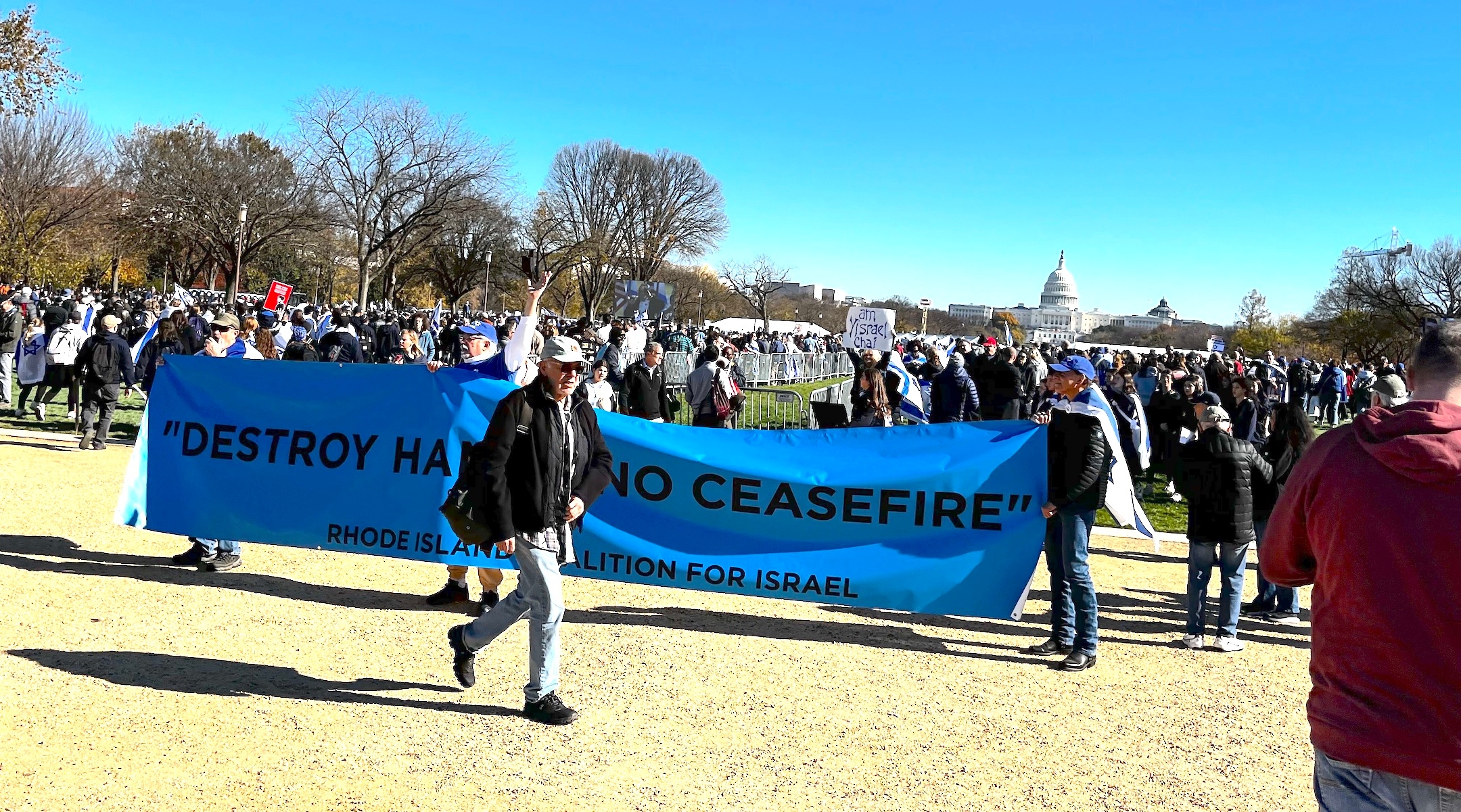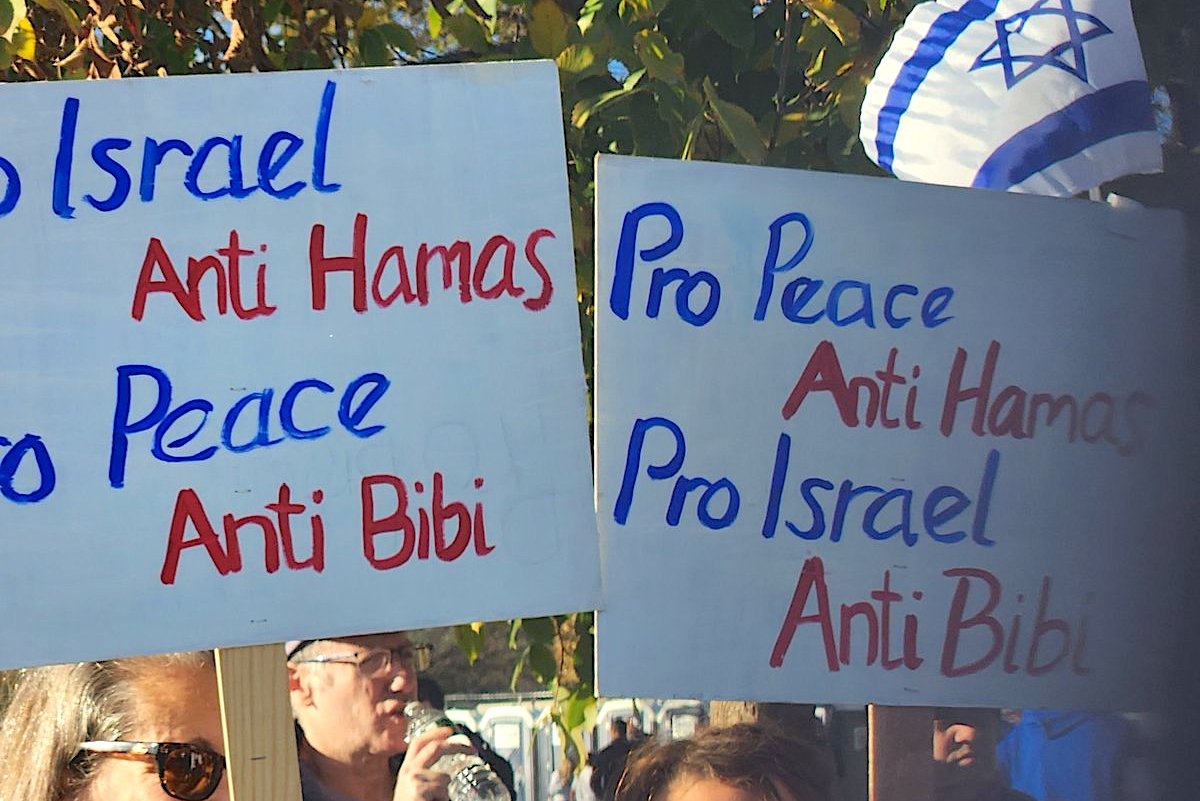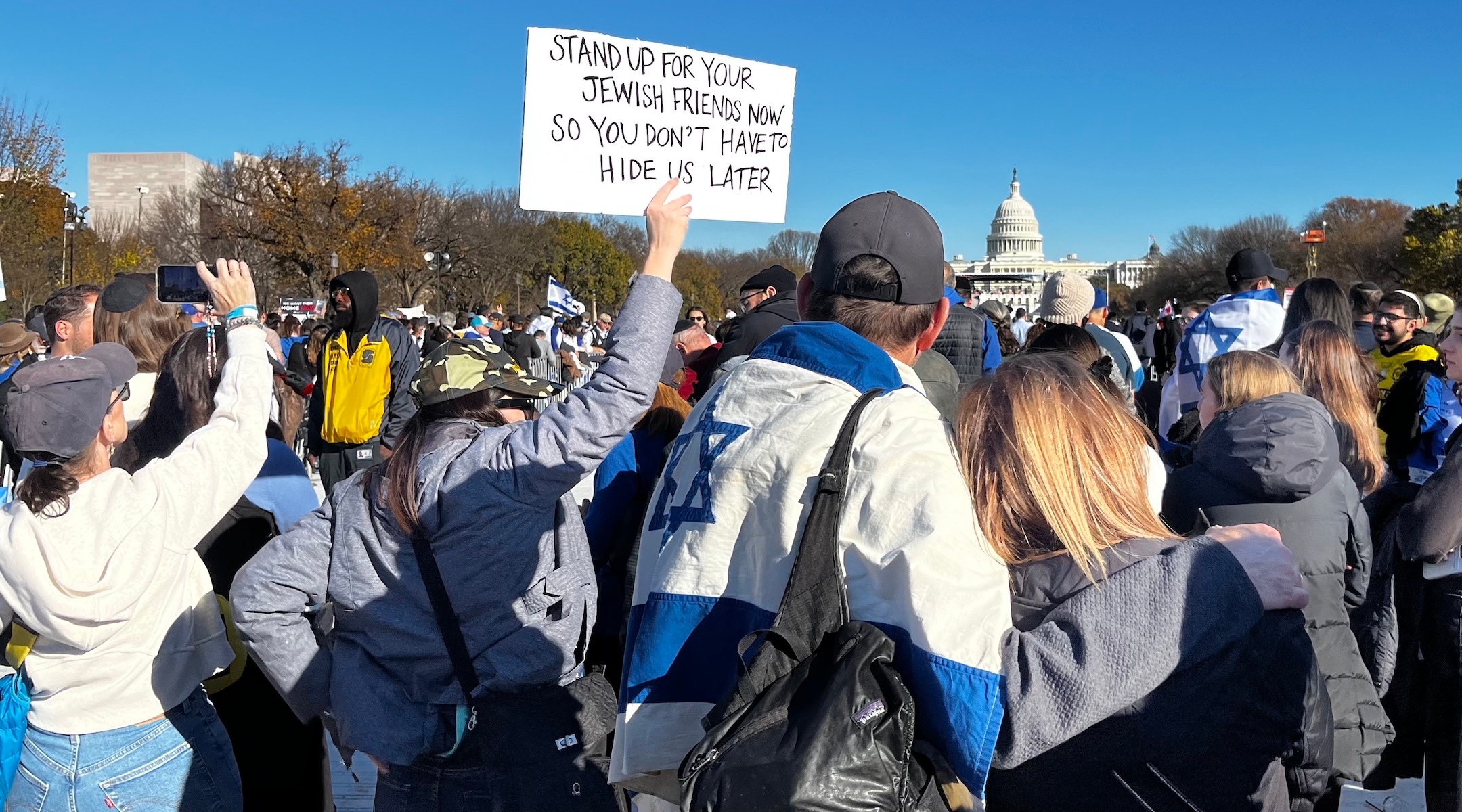WASHINGTON (JTA) — I didn’t cover or attend the Free Soviet Jewry rally in Washington in 1987, but I’ve seen the photographs.
That rally, which drew some 250,000 Jews to the National Mall, was long considered a high point for Jewish street activism, the benchmark against which all demonstrations since have been measured. The rally apparently caught the attention of then-President Ronald Reagan and Soviet Premier Mikhail Gorbachev, who were to meet the next day. Over the next three years, hundreds of thousands of Jews left the “Evil Empire” for the United States and Israel.
The best-known photos of that rally show a sea of people under a “Let My People Go” banner. In its laser-focused call on the Soviets to end the oppression of their Jews and allow them to emigrate, that rally’s lack of complexity was perhaps its greatest strength.
By contrast, Tuesday’s March for Israel defied one simple slogan. The official organizers suggested three: “March for Israel. March to free hostages. March against antisemitism.” It was a multi-pronged rallying cry for complicated times: The war launched when Hamas slaughtered 1,200 Jews on Oct. 7 has whipped up as many crises as it has emotions.
That complexity and even confusion were reflected at Tuesday’s march. A lot of the people in the massive crowd — estimates, backed by data from the folks handling security, put it at some 290,000 — carried signs with names and images of some of the 240 people kidnapped by Hamas in the initial attack. “Bring them home” was a common placard. One Orthodox feminist carried a sign with a verse from Jeremiah: “She refuses to be comforted, because her children are missing.”

The Rhode Island Coalition for Israel unfurled a banner at the March for Israel rally reading, “Destroy Hamas — No Ceasefire,” Nov. 14, 2023. (JTA Photo)
Some signs thanked the Biden administration and Congress for giving Israel a wide berth, and significant financial backing, for its war on Hamas. Many of the signs echoed calls from the stage, including by Deborah Lipstadt, the State Department’s special envoy on antisemitism, to “stand shoulder to shoulder” against the anti-Israelism expressed as antisemitism at pro-Palestinian rallies and on college campuses.
Meanwhile, the invitation to “March for Israel” was less a slogan than a set-up to an old Jewish joke: One catchphrase, three opinions. For many in the crowd, it meant “no ceasefire” and spurning calls on Israel from around the globe to halt the attacks that have so far, according to the Hamas-run Health Ministry in Gaza, cost more than 10,000 Palestinian lives. (The chant was heard perhaps the loudest when Van Jones, the CNN commentator, called for “no more rockets from Gaza, and no more bombs falling down on the people of Gaza” — an even-handed statement that drew boos and threatened to drown out his main point about liberals who have abandoned pro-Israel colleagues like him.)
“Let Israel finish the job!” read one sign held by a rally-goer. “Thank you Israel for fighting terror,” read another. The Rhode Island Coalition for Israel unfurled a huge banner reading, “Destroy Hamas — No Ceasefire.”
But if there was one “for Israel” message, it was one of apolitical unity, expressed in the “Philly stands with Israel” and “Cleveland stands with Israel” signs that seem to have been coordinated by one of the rally’s two organizers, the Jewish Federations of North America. “Standing” doesn’t commit the stander to a specific political agenda, except in this case to the baseline belief that Israel is a country that deserves to exist and defend itself if its people or security are threatened. At bare minimum, many attendees said they were there to counter pro-Palestinian demonstrations — including many arranged by non-Zionist Jewish groups — that seemed to reject even that much.
That could be seen in the day’s prevailing aesthetic: the blue and white Israeli flag. Many wore the flag as a cape. College students and day school kids daubed it on their faces. Groups were handing out little Israeli flags. Before Oct. 7, the huge crowds in Israel opposing their far-right government’s judicial reforms had reclaimed the flag as a symbol of Jewish democracy. On Tuesday, it took on a particularly American meaning: to be Jewish here is to care deeply about Israel, putting aside the inevitable disagreements about what the country should be and what course it should be taking in its war on Hamas.

One sign carried in the “peace bloc” section of the March for Israel rally read “Pro Peace, Anti Hamas, Pro Israel, Anti Bibi,” using Israeli Prime Minister Netanyahu’s nickname, Nov. 14, 2023. (Via Facebook)
That broad-tent message even allowed some left-wing Jewish groups to join the march, despite their qualms that it might support a right-wing agenda and ignore the growing civilian death toll in Gaza. Americans for Peace Now, J Street and the National Council of Jewish Women made up a “peace bloc” with T’ruah, the rabbinic human rights group. “I stand with Israelis. I stand with Palestinians. I stand with humanity,” read a sign carried by T’ruah.
In an email to T’ruah followers, the group’s CEO, Rabbi Jill Jacobs, said they’d be taking part “in a way that allows you to grieve with Israelis, stand with the families of hostages, support our Jewish community through rising antisemitism, and also grieve for innocent Palestinians.” That message also seemed an effort to reclaim the left-wing conversation from the anti- and non-Zionist Jewish groups. One sign carried in the “peace bloc” read “Pro-Peace, Anti Hamas, Pro Israel, Anti Bibi,” using Israeli Prime Minister Benjamin Netanyahu’s nickname.
It’s the rare Jewish event that can attract doves and hawks, black-hatted Orthodox Jews, queer Zionists waving rainbow flags, secular Israelis and busloads of suburban synagogue-goers of all denominations. And that’s perhaps why — despite the grieving Israeli families, the missing hostages, the unrelenting bombardment of Gaza — the rally took on a festive mood at times. People seemed genuinely relieved to loudly and safely celebrate their attachment to Israel in a crowd where Israel’s existence wouldn’t be called into question, its right to defend itself was taken for granted and wearing a Star of David didn’t mark them as “colonialists” or worse.
That there wasn’t a single slogan that can become the lasting image from this remarkable day isn’t a surprise. It feels obvious that if the organizers had picked one agenda — no ceasefire, free the hostages, stand up against antisemitism — they would have lost a large chunk of the crowd and potential allies.
But in service of a hopeful future, there’s one image that could endure — a message of unity that lasted at least for a few hours on Tuesday. A colleague saw a sign quoting Psalm 133: “How good and how pleasant it is that brothers (and sisters) dwell together.”
JTA has documented Jewish history in real-time for over a century. Keep our journalism strong by joining us in supporting independent, award-winning reporting.






